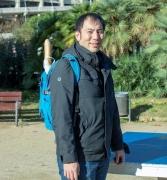Research Experience
-
2024.04-Now
Waseda University Advanced Research Center for Human Sciences
-
2024.04-Now
Waseda University Faculty of Human Sciences Junior researcher
-
2023.10-2024.03
Kyoto University Graduate School of Asian and African Area Studies Program-Specific Researcher (JSPS RPD)
-
2023.04-2024.03
Kyoto University Center for African Area Studies Specially Appointed Assistant Professor
-
2023.04-2023.09
Japan Society for the Promotion of Science Restart Research Fellow
-
2017.04-2023.03
Kyoto University Center for African Area Studies Specially Appointed Research Fellow
-
2019.04-2022.03
Japan Society for the Promotion of Science Special researcher of the Japan Society for the Promotion of Science PD


Click to view the Scopus page. The data was downloaded from Scopus API in August 30, 2025, via http://api.elsevier.com and http://www.scopus.com .